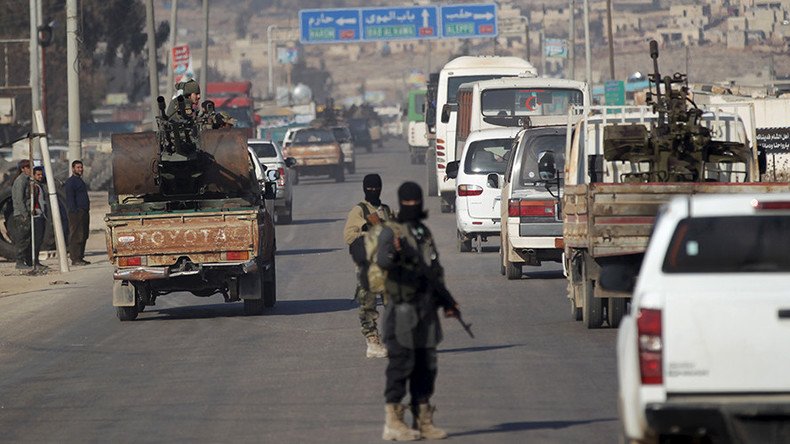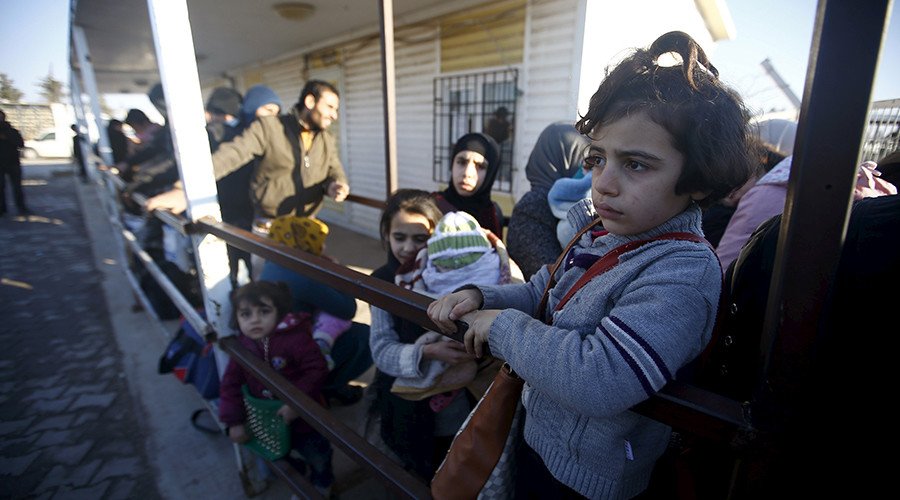No strategic divide between US & Turkey – only a division of labor

No one should be fooled into thinking the recent Turkish shelling and pressure for a ‘no-fly zone’ put it at odds with the US – rather they fulfill US strategic goals whilst simultaneously providing ‘plausible deniability’.
One week ago, on February 10, units from the Syrian Democratic Forces (SDF) alliance captured Menagh airbase and several surrounding villages in northwest Syria from Al-Qaeda franchise Jabhat Al-Nusra and their allies Ahrar Al Sham, who had held it since August 2013. One might think the liberation of such a significant asset would be a cause for celebration amongst the NATO powers who are, after all, supposedly facing an existential threat from Al-Qaeda and its various offshoots.
But apparently not. By the weekend, NATO member Turkey was shelling the base and its surrounding regions, with Turkish Prime Minister Ahmed Davutoglu vowing to render it “unusable” unless the SDF withdraw – that is to say, hand it back to Al-Qaeda. Their bombardment has continued ever since, hitting Syrian government forces in the town of Deir Jamal, as well as the SDF. Davutoglu promised “the harshest reaction” if the SDF were to take the town of Azaz – currently controlled by, you guessed it, Ahrar al Sham and Al-Qaeda – towards which they were rapidly advancing. “We will not allow Azaz to fall,” he said, ‘fall’ here being a euphemism for liberation from the Wahhabi death squads.
At the same time, Saudi Arabia and Turkey have been regularly briefing the media about their desire to send their armies into Syria, to establish a ‘safe zone’ on the Turkish-Syrian border aimed at keeping open the supply lines to rebel-controlled territories such as Aleppo (dominated, according to the Institute for the Study of War, by Al-Qaeda, ISIS and Ahrar Al Sham). Turkish military sources have subsequently announced that Saudi jets are to be deployed at the Incirlik airbase in Turkey within the coming weeks.
For some commentators, all of this demonstrates that Turkey has somehow gone ‘rogue’, putting it at odds with the US and straining the sinews of its alliance. Turkey is facilitating militant jihadis, it is argued, whilst the US is trying to fight them; and it is attacking the SDF, who the US is supporting. The SDF is, after all, an official ally of the US, who has been advancing thanks in part to US air support – yet is viewed by Turkey as a terrorist group due to the presence in their ranks of the Kurdish YPG, who have fraternal relations with the PKK, with whom the Turkish state has been at war for decades. For the Guardian, “the Turkish strikes…triggered alarm in Washington”, whilst a Reuters headline suggested that the “Kurdish advance in Syria divides US and Turkey”. “Following Turkish President Recep Tayyip Erdogan's remarks calling on the US to choose between its ally Turkey and “the terrorists in Kobani,” wrote the Turkish newspaper Sunday’s Zaman “Ankara is now not on good terms with the US”.
The reality, however, is that Turkey appears to have had US approval every step of the way.
Take, for example, the official US reaction to the Turkish shelling. Statements by State Department spokesman John Kirby have generally been depicted as ‘admonishing’ Turkey for its actions. In fact, he called for “de-escalating tensions on all sides,” adding that “we have urged Syrian Kurdish and other forces affiliated with the YPG not to take advantage of a confused situation by seizing new territory.” In other words, he has repeated Turkey’s demands that northwest Syria be left under Al-Qaeda control. This hardly qualifies as a major dressing down.

Also hugely important to note is that right between the seizure of Menagh on Wednesday and the beginning of Turkish shelling on Saturday, NATO had 2 important meetings: one formal, one informal. On Thursday, buried deep in an announcement about NATO operations in the Aegean Sea, Secretary General Jens Stoltenberg mentioned that NATO had also agreed “to intensify intelligence, surveillance and reconnaissance at the Turkish-Syrian border.”
That was the formal meeting. Later that day – that is just one day before the International Syria Support Group announced plans for a “cessation of hostilities” - the defense secretaries of the US, the UK, Turkey and the Gulf states met at NATO HQ to discuss the possibility of inserting ground troops into Syria and establishing a “no-fly zone” on the Syrian-Turkish border. Talking in advance of this meeting, US Defense Secretary Ash Carter appeared to relish such action, welcoming the prospect of “strong contributions” from the Gulf States, which he said would be a “good thing”. “There are lots of different ways that Saudi Arabia and Bahrain can contribute,” he noted, “one of them is on the ground – and we’ll definitely be discussing that – but there are lots of other ways as well.” Two days later, Turkey began shelling Syria.
Ostensibly, these were meetings of the ‘anti-ISIS’ coalition. But, as the Guardian innocently noted, “Given that the US and its allies have been in action against ISIS in Syria and Iraq since September 2014, it is remarkable that the meeting on Thursday afternoon is the first to be held by the defense ministers from the anti-ISIS coalition.” What has really prompted their sense of urgency has nothing to do with the ‘phony‘ war against ISIS, and everything to do with the growing military success of the Syrian government.
Rhetorical nonsense about the need to ‘combat ISIS’ notwithstanding, it is clear that Turkey and the West remain very much on the same page over Syria. There is indeed a red line for both, and that red line is the prospect of a Syrian government victory – which, following Russia’s decisive intervention now seems like a very real possibility. The major rebel supply line to Aleppo was cut off on February 3, meaning that both the recapture of Aleppo and the sealing of the Turkish-Syrian border now lie visibly within the government’s grasp. As Reuters has correctly noted, “That would amount to its most decisive victory of the war so far, and probably put an end to rebel hopes of removing Assad by force, their goal throughout years of fighting that has driven 11 million people from their homes.”
Such an outcome would have monumental consequences for the entire globe. It would mark the first decisive defeat for a Western-sponsored regime change operation since the end of the Cold War, perhaps since Vietnam. It would demonstrate that the new ‘4+1’ alliance (of Iran, Iraq, Russia, Syria and Hezbollah) are able to inflict defeat on Western-backed forces, rendering US sponsorship and protection all but worthless. It would provide states over the world with the military rationale (the economic rationale is already obvious) for aligning themselves with the BRICS rather than the US. And it would make sectarian death squads throughout the region, for long the ‘cheap power’ arm of US and British foreign policy, wary of ever again relying on Western backing. In short, it would mark an unprecedented and irreversible shift in power from West to East.
There is no way that the Western powers are going to allow this to happen lying down. And plans are rapidly being drawn up to avoid this. The aim is to ensure the Syrian-Turkish border stays open, to guarantee that the rebels supply lines are not jeopardized; this is the only way to avoid defeat in, not only, Aleppo, but in Syria as a whole. How to do this?
First, Turkey is filling the Syrian side of its border crossing with refugees to act as human shields. Last week, for the first time, President Erdogan closed the border to fleeing refugees, instead setting up camps inside Syria. These will provide the ‘collateral damage’ necessary to paint any Syrian government-Kurdish – Russian moves to take the territory and seal the border as a massacre and humanitarian emergency. Erdogan’s comments last week that the United Nations needed to step in to prevent “ethnic cleansing” are clearly part of the ideological groundwork to prepare for a ‘humanitarian intervention’ which, in reality, will serve to create a NATO-backed, Turkish and Saudi-enforced, occupation zone in northwest Syria designed to keep the border open, keep the death squads supplied with weapons and fighters, and, in short, keep the war going.
Far from angering Washington, Turkey’s actions put it right at the vanguard of US strategic designs. Make no mistake; the US is preparing to fight Russia – right down to the last Turk.
The statements, views and opinions expressed in this column are solely those of the author and do not necessarily represent those of RT.













